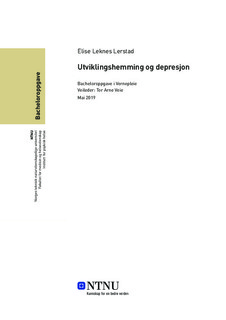Utviklingshemming og depresjon
Bachelor thesis

View/
Date
2019Metadata
Show full item recordCollections
- Institutt for psykisk helse [1197]
Abstract
Tittel: Utviklingshemming og depresjonIntroduksjon/bakgrunn: Depresjon blant personer med utviklingshemming er tre ganger så vanlig som blant normalbefolkningen. Dette er på grunn av den biologiske og genetiske sårbarheten. I motsetning til normalbefolkningen har de i tillegg en psykologisk sårbarhet som gjør at de er enda mer utsatte for å utvikle en depresjon. Hensikt: Hensikten med studien er å opparbeide kunnskap om hvilke risikofaktorer som kan bidra til utviklingen av depresjon blant mennesker med utviklingshemming. Metode: Denne bacheloroppgaven er en litteraturstudie. Det er utført søk i forskjellige databaser etter relevante forskningsartikler som kan belyse problemstillingen. 5 forskningsartikler er inkludert i studien. Resultater: Funnene fra forskningsartiklene belyste tre hovedtema som kan ha betydning for utvikling av depresjon blant mennesker med utviklingshemming. Disse temaene er: mangel på sosial støtte og relasjoner, utløsende hendelser – stress, og sammenligning med andre og negativ selvfølelse. Konklusjon: Det er viktig at profesjoner har kunnskap om hvilke risikofaktorer som kan være medvirkende for utvikling av depresjon. Viktigheten av sosial støtte og gode relasjoner er gjennomgående i alle artiklene, og mangelen på dette kan derfor være medvirkende for utvikling av depresjon blant mennesker med utviklingshemming. Title: Intellectual disability and depressionIntroduction/background: Depression among people with developmental intellectual disabilities is three times as common as the normal population. This is due to the biological and genetic vulnerability. In contrast to the normal population, they also have a psychological vulnerability that makes them even more vulnerable to developing depressionAim: The aim of this study is to acquire knowledge about the risk factors associated with depression among people with intellectual disability. Method: This study is a literature study. Different searches in data bases were performed in search of scientific research articles that can 5 research articles were included in this study.Results: The findings from the research articles highlighted three main themes that may be important for the development of depression among people with developmental disabilities. These topics are: lack of social support and relationships, triggering events - stress, and comparison with others and negative self-esteem.Conclusion: It is important that professionals have knowledge of which risk factors can contribute to the development of depression. The importance of social support and good relationships is common throughout all the articles, and the lack of this can therefore contribute to the development of depression among people with disabilities.